Levels of Governance in Policy Innovation Cycles in Community Education: The Cases of Education for Sustainable Development and Climate Change Education
Abstract
1. Introduction
2. State of the Art
2.1. Climate Change Education
2.2. Education for Sustainable Development (This Section Summarizes the Main Findings of [9])
3. Theoretical and Methodological Orientation
3.1. Theoretical Orientation
3.2. Measuring Influence in Complex Multi-Actor and Multi-Level Policy Settings
3.3. SNA as a Tool for Studying CCE and ESD
4. Results
4.1. Social Network Analysis in Climate Change Education (This Section Summarizes the Main Findings of [1])
4.2. Social Network Analysis of Education for Sustainable Development (This Section Summarizes the Main Findings of [9])
5. Discussion
Acknowledgments
Author Contributions
Conflicts of Interest
Funding
References
- Kolleck, N.; Well, M.; Sperzel, S.; Jörgens, H. Climate Change Education through Social Networks: How a Treaty Secretariat Creates Momentum for Education in the UNFCCC. Glob. Environ. Politics 2017, in press. [Google Scholar] [CrossRef]
- Song, M.; Miskel, C.G. Exploring the Structural Properties of the State Reading Policy Domain Using Network Visualization Technique. Educ. Policy 2007, 21, 589–614. [Google Scholar] [CrossRef]
- White, H. Identity and Control: How Social Formations Emerge; Princeton University Press: Princeton, NJ, USA, 2008. [Google Scholar]
- Tilbury, D.; Wortman, D. How is Community Education Contributing to Sustainability in Practice? Appl. Environ. Educ. Commun. 2008, 7, 83–93. [Google Scholar] [CrossRef]
- Kagawa, F.; Selby, D. Education and Climate Change: Living and Learning in Interesting Times; Routledge: New York, NY, USA, 2010. [Google Scholar]
- United Nations Educational, Scientific and Cultural Organization (UNESCO). Not Just Hot Air, Putting Climate Change Education into Practice. 2015. Available online: http://www.uncclearn.org/sites/default/files/inventory/unesco01_0.pdf (accessed on 22 March 2017).
- United Nations Framework Convention on Climate Change (UNFCCC). FCCC/INFORMAL/84 United Nations Framework Convention on Climate Change; UNFCCC: Bonn, Germany, 1992. [Google Scholar]
- United Nations Framework Convention on Climate Change (UNFCCC). Paris Agreement; UNFCCC: Bonn, Germany, 2015. [Google Scholar]
- Kolleck, N. Uncovering influence through Social Network Analysis: The role of schools in Education for Sustainable Development. J. Educ. Policy 2016, 31, 308–329. [Google Scholar] [CrossRef]
- Kolleck, N. Innovationen und Bildungslandschaften: Ergebnisse Sozialer Netzwerkanalysen. In Auf dem Weg zu Nachhaltigen Bildungslandschaften. Lokale Netzwerke Erforschen Und Gestalten; Fischbach, R., Kolleck, N., de Haan, G., Eds.; VS/Springer Verlag: Wiesbaden, Germany, 2015; pp. 55–68. [Google Scholar]
- Kolleck, N.; Bormann, I. Analyzing trust in innovation networks: Combining quantitative and qualitative techniques of Social Network Analysis. Zeitschrift für Erziehungswissenschaft 2014, 17, 9–27. [Google Scholar] [CrossRef]
- Kolleck, N.; Bormann, I.; Höhne, T. Zum Innovations- und Bildungsverständnis von Stiftungen. Zeitschrift für Pädagogik 2015, 61, 793–807. [Google Scholar]
- Springett, D. Education for Sustainable Development. In Routledge International Handbook of Sustainable Development; Redclift, M.R., Springett, D., Eds.; Routledge: London, UK, 2015; pp. 105–119. [Google Scholar]
- Boeve-de Pauw, J.; Gericke, N.; Olsson, D.; Berglund, T. The Effectiveness of Education for Sustainable Development. Sustainability 2015, 7, 15693–15717. [Google Scholar] [CrossRef]
- De Haan, G.; Bormann, I.; Leicht, A. Introduction: The midway point of the UN Decade of Education for Sustainable Development: Current research and practice in ESD. Int. Rev. Educ. 2010, 56, 199–206. [Google Scholar] [CrossRef]
- Evans, N.; Whitehouse, H.; Gooch, M. Barriers, Successes and Enabling Practices of Education for Sustainability in Far North Queensland Schools: A Case Study. J. Environ. Educ. 2012, 43, 121–138. [Google Scholar] [CrossRef]
- Gourevitch, P. The Second Image Reversed: The International Sources of Domestic Politics. Int. Org. 1978, 32, 881–912. [Google Scholar] [CrossRef]
- Jörgens, H. Governance by Diffusion: Implementing Global Norms through Cross-National Imitation and Learning. In Governance for Sustainable Development: The Challenge of Adapting Form to Function; Lafferty, W.M., Ed.; Edward Elgar: Cheltenham, UK, 2004; pp. 246–283. [Google Scholar]
- Risse, T.; Ropp, S.C.; Sikkink, K. The Persistent Power of Human Rights: From Commitment to Compliance; Cambridge University Press: Cambridge, UK, 2013. [Google Scholar]
- Madsen, K. Unfolding Education for Sustainable Development as Didactic Thinking and Practice. Sustainability 2013, 5, 3771–3782. [Google Scholar] [CrossRef]
- Cebrián, G.; Junyent, M. Competencies in Education for Sustainable Development: Exploring the Student Teachers’ Views. Sustainability 2015, 7, 2768–2786. [Google Scholar] [CrossRef]
- Uherek, E.; Schüpbach, E. European Efforts in Earth Science and Climate Change Education. Phys. Geogr. 2008, 29, 545–560. [Google Scholar] [CrossRef]
- Sarabhai, K.V.; Ravindranath, S.; Schwarz, R.; Vyas, P. ESD and the Rio Conventions. J. Educ. Sustain. Dev. 2012, 6, 181–190. [Google Scholar] [CrossRef]
- Fulge, T.; Bieber, T.; Martens, K. Rational Intentions and Unintended Consequences: On the Interplay between International and National Actors in Education Policy. In The Handbook of Global Education Policy; Mundy, K.E., Green, A., Lingard, B., Verger, A., Eds.; John Wiley & Sons: Malden, MA, USA, 2016; pp. 453–469. [Google Scholar]
- Dingwerth, K.; Jörgens, H. Environmental Risks and the Changing Interface of Domestic and International Governance. In The Oxford Handbook on Transformation of the State; Leibfried, S., Nullmeier, F., Huber, E., Lange, M., Levy, J., Stephens, J., Eds.; Oxford University Press: Oxford, UK, 2015; pp. 338–354. [Google Scholar]
- Jansen, D.; Wald, A. Netzwerktheorien. In Handbuch Governance: Theoretische Grundlagen und empirische Anwendungsfelder; Benz, A., Lütz, S., Schimank, U., Simonis, G., Eds.; VS Verlag für Sozialwissenschaften: Wiesbaden, Germany, 2007; pp. 188–199. [Google Scholar]
- Borgatti, S.P.; Lopez-Kidwell, V. Network Theory. In The SAGE Handbook of Social Network Analysis; Scott, J., Carrington, P.J., Eds.; Sage: London, UK, 2011; pp. 40–54. [Google Scholar]
- Granovetter, M.S. The Strength of Weak Ties. Am. J. Sociol. 1973, 78, 1360–1380. [Google Scholar] [CrossRef]
- Burt, R.S. Toward a Structural Theory of Action: Network Models of Social Structure, Perception, and Action; Academic Press: New York, NY, USA, 1982. [Google Scholar]
- Coleman, J.S. Social capital in the creation of human capital. Am. J. Sociol. 1988, 94, 95–120. [Google Scholar] [CrossRef]
- Verweij, S.; Klijn, E.-H.; Edelenbos, J.; van Buuren, A. What makes governance networks work? A Fuzzy set qualitative comparative analysis of 14 Dutch spatial planning projects. Public Adm. 2013, 91, 1035–1055. [Google Scholar] [CrossRef]
- Ward, M.D.; Stovel, K.; Sacks, A. Network Analysis and Political Science. Ann. Rev. Political Sci. 2011, 14, 245–264. [Google Scholar] [CrossRef]
- Dür, A. Interest groups in the European Union: How powerful are they? West Eur. Politics 2008, 31, 1212–1230. [Google Scholar] [CrossRef]
- Ingold, K.; Leifeld, P. Structural and Institutional Determinants of Influence Reputation: A Comparison of Collaborative and Adversarial Policy Networks in Decision Making and Implementation. J. Public Adm. Res. Theory 2016, 26, 1. [Google Scholar] [CrossRef]
- Lecy, J.D.; Mergel, I.A.; Schmitz, H.P. Networks in Public Administration: Current Scholarship in Review. Public Manag. Rev. 2014, 16, 643–665. [Google Scholar] [CrossRef]
- Rode, H.; Michelsen, G. Der Beitrag der UN-Dekade 2005–2014 zur Verbreitung und Verankerung der Bildung für nachhaltige Entwicklung; Deutsche UNESCO-Kommission e.V. (DUK): Bonn, Germany, 2012. [Google Scholar]
- Ye, K.; Liu, G.; Shan, Y. Networked or Un-Networked? A Preliminary Study on KIBS-Based Sustainable Urban Development: The Case of China. Sustainability 2016, 8, 509. [Google Scholar] [CrossRef]
- Bodin, Ö.; Crona, B.I. The role of social networks in natural resource governance: What relational patterns make a difference? Glob. Environ. Chang. 2009, 19, 366–374. [Google Scholar] [CrossRef]
- Lubell, M.; Schneider, M.; Scholz, J.T.; Mete, M. Watershed Partnerships and the Emergence of Collective Action Institutions. Am. J. Political Sci. 2002, 46, 148–163. [Google Scholar] [CrossRef]
- Slaughter, A.-M. The Chessboard and the Web: Strategies of Connection in a Networked World; Yale University Press: New Haven, CT, USA, 2017. [Google Scholar]
- Kwak, H.; Lee, C.; Park, H.; Moon, S. What is Twitter, a social network or a news media? In Proceedings of the 19th International Conference on World Wide Web, Raleigh, NC, USA, 26–30 April 2010; pp. 591–600. [Google Scholar]
- Wasserman, S.; Faust, K. Social Network Analysis: Methods and Applications, 19th ed.; Cambridge Univ. Press: Cambridge, UK, 2009. [Google Scholar]
- Scott, J. Social Network Analysis: A Handbook; Sage: Los Angeles, CA, USA, 2007. [Google Scholar]
- Fischer, C. To Dwell among Friends: Personal Networks in Town and City; The University of Chicago Press: Chicago, IL, USA, 1982. [Google Scholar]
- Kowald, M.; Axhausen, K.W. Focusing on Connected Personal Leisure Networks: Selected Results from a Snowball Sample. Environ. Plan. 2012, 44, 1085–1100. [Google Scholar] [CrossRef]
- Leontief, W. The Structure of American Economy, 1919–1929: An Empirical Application of Equilibrium Analysis; Harvard University Press: Cambridge, MA, USA, 1941. [Google Scholar]
- Seeley, J.R. The net of reciprocal influence; a problem in treating sociometric data. Can. J. Psychol. Rev. Can. Psychol. 1949, 3, 234–240. [Google Scholar] [CrossRef]
- Mejova, Y.; Weber, I.; Macy, M. Twitter: A Digital Socioscope; Cambridge University Press: New York, NY, USA, 2015. [Google Scholar]
- Blondel, V.; Guillaume, J.-L.; Lambiotte, R.; Lefebvre, E. Fast Unfolding of Communities in Large Networks. J. Stat. Mech. Theory Exp. 2008, 2008. [Google Scholar] [CrossRef]
- Dekker, D.; Krackhardt, D.; Snijders, T.A.B. Sensitivity of MRQAP Tests to Collinearity and Autocorrelation Conditions. Psychometrika 2007, 72, 563–581. [Google Scholar] [CrossRef] [PubMed]
- Kolleck, N. Innovations through networks: Understanding the role of social relations for educational innovations. Zeitschrift für Erziehungswissenschaft 2014, 17, 47–64. [Google Scholar] [CrossRef]
- Shiroma, E.O. Networks in action: New actors and practices in education policy in Brazil. J. Educ. Policy 2014, 29, 323–348. [Google Scholar] [CrossRef]
- Valente, T.W. Network Models and Methods for Studying the Diffusion of Innovations. In Models and Methods in Social Network Analysis; Carrington, P.J., Scott, J., Wasserman, S., Eds.; Cambridge Univ. Press: Cambridge, UK, 2005; pp. 98–116. [Google Scholar]

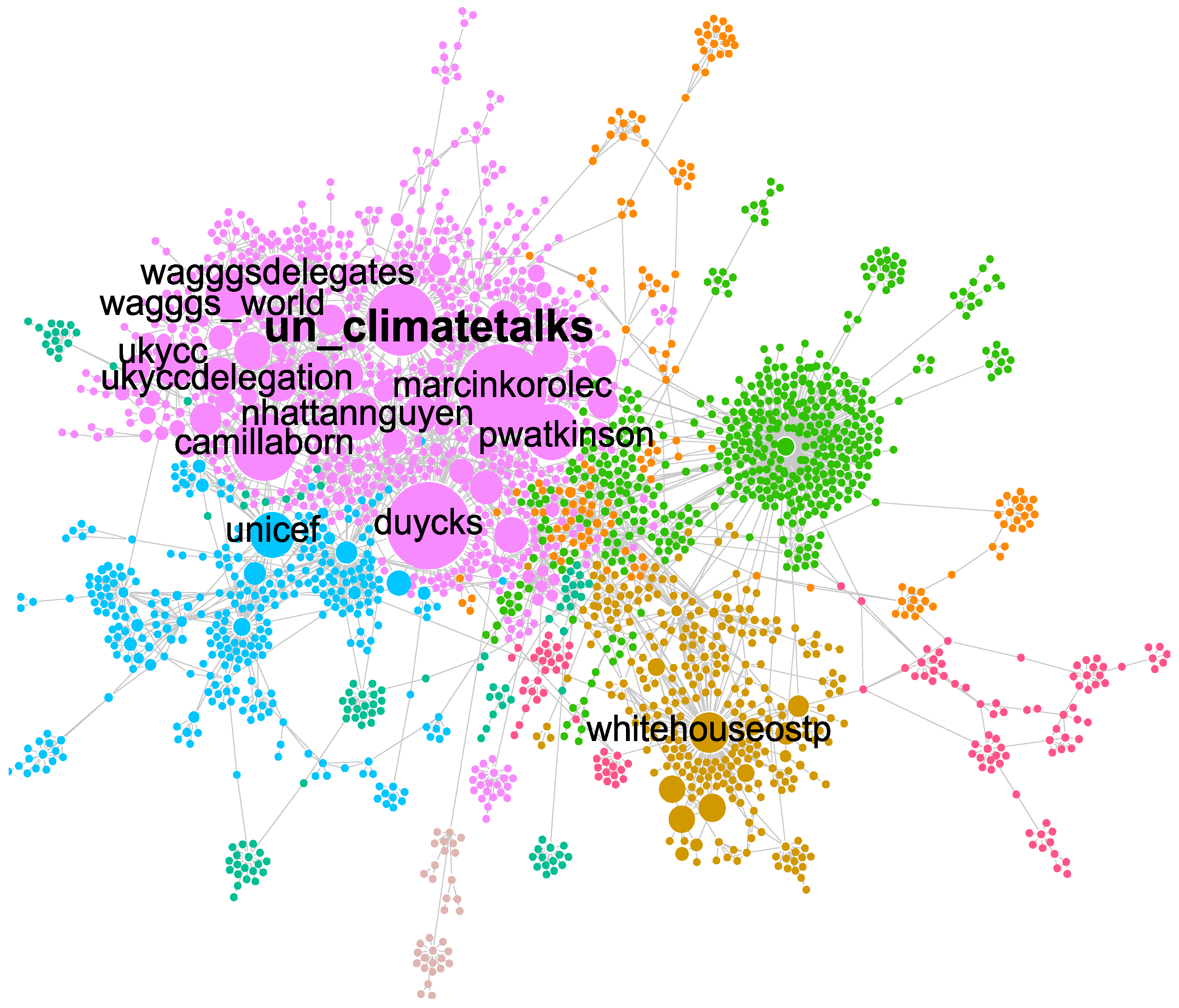
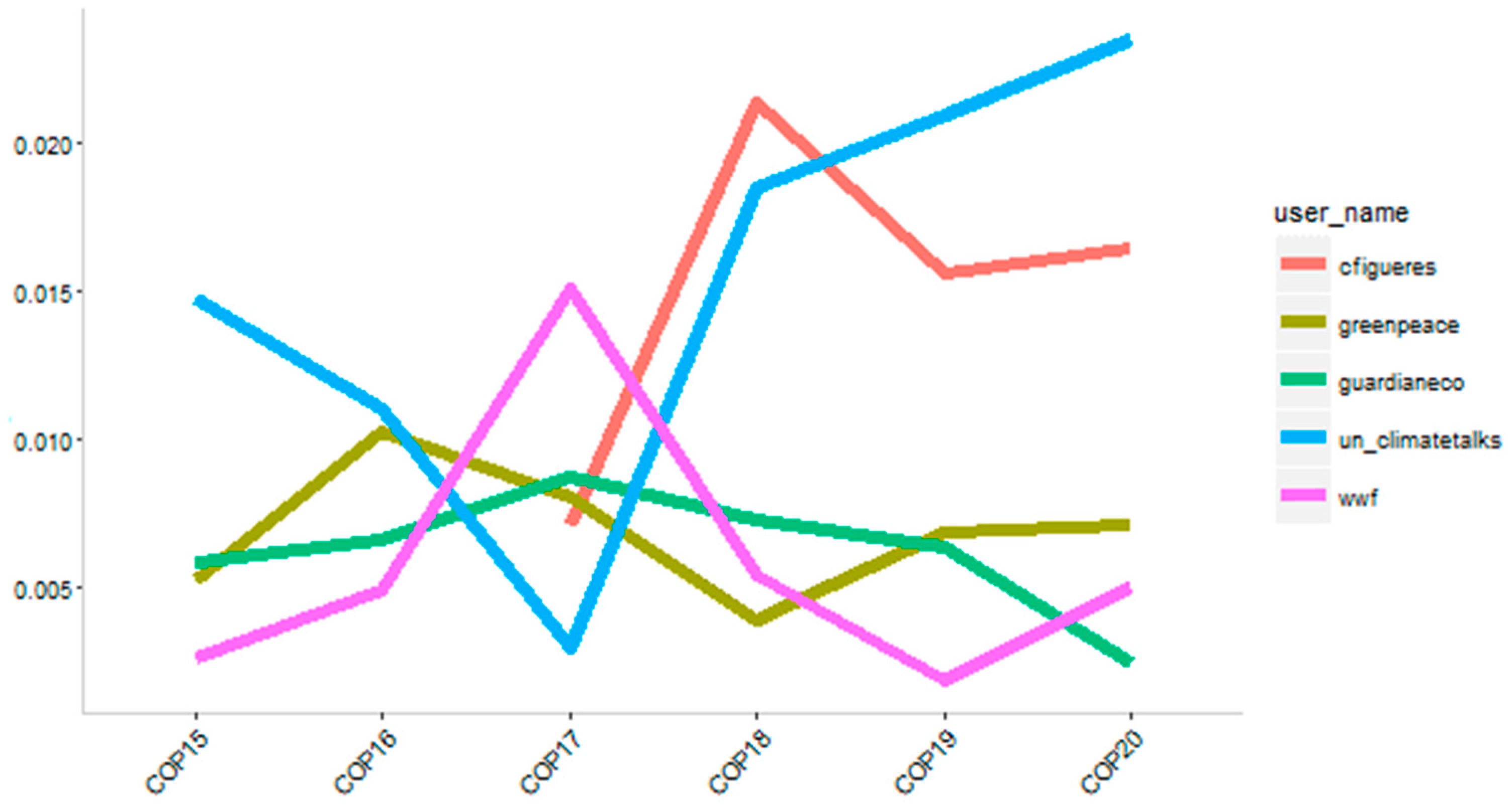
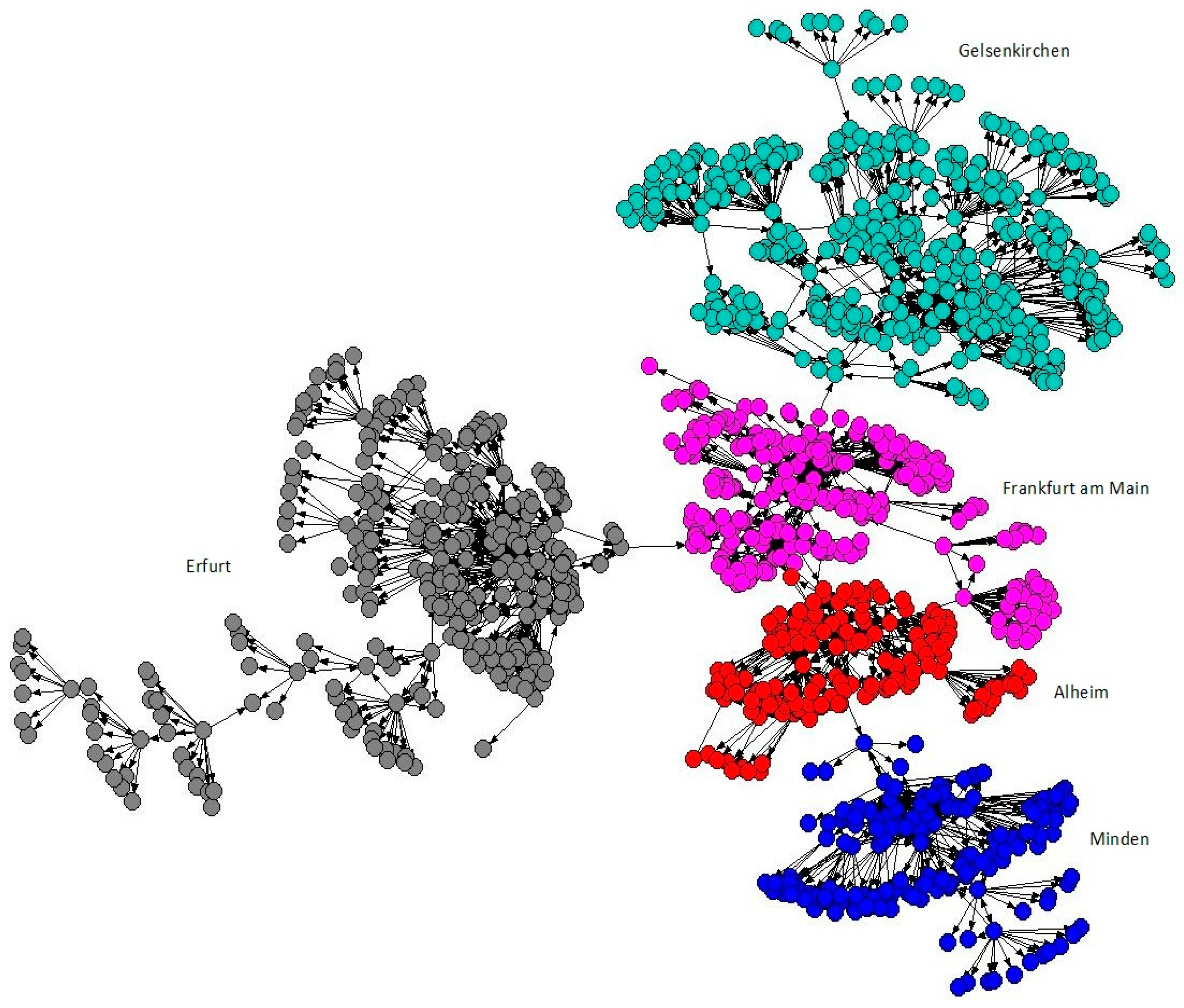
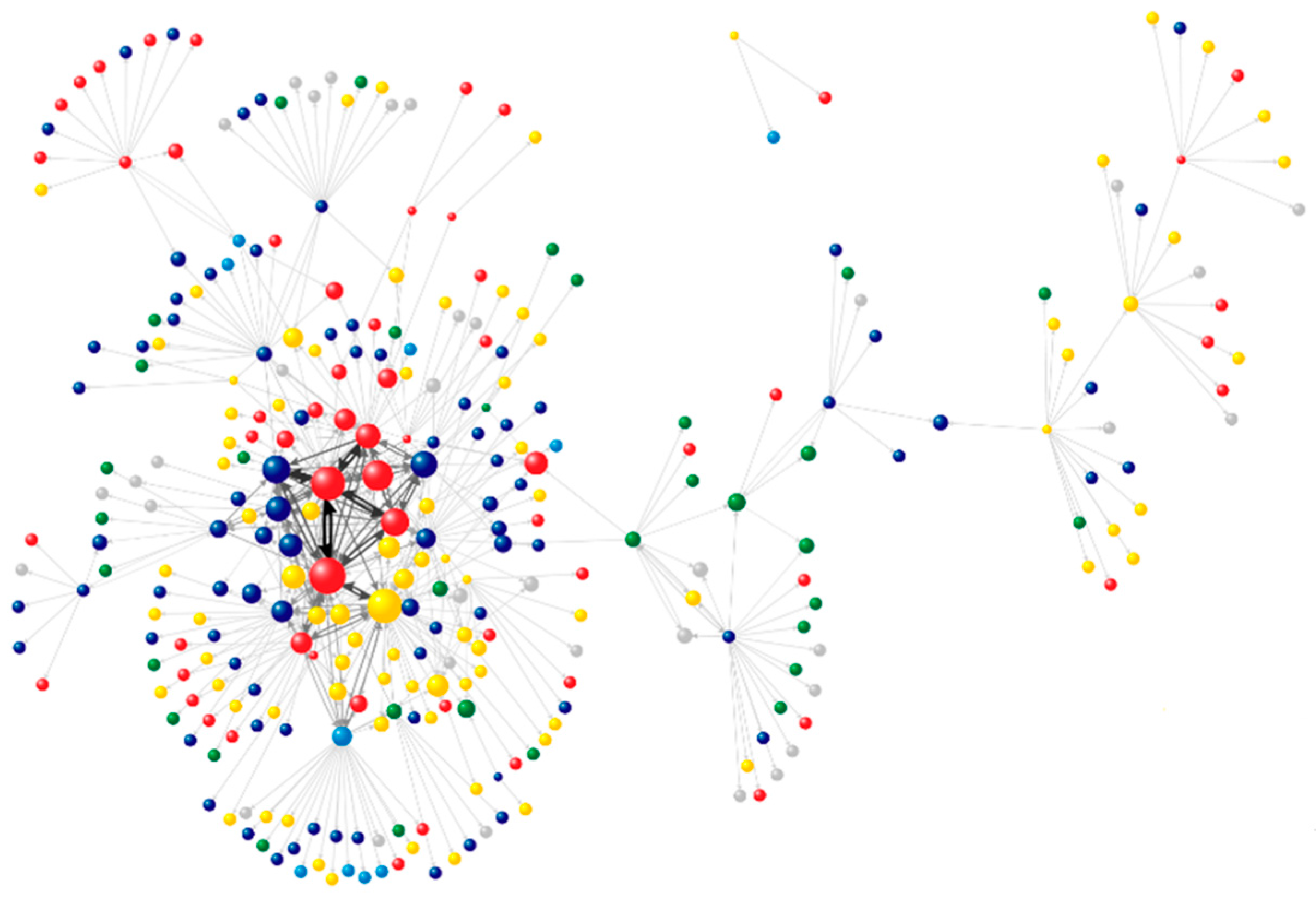
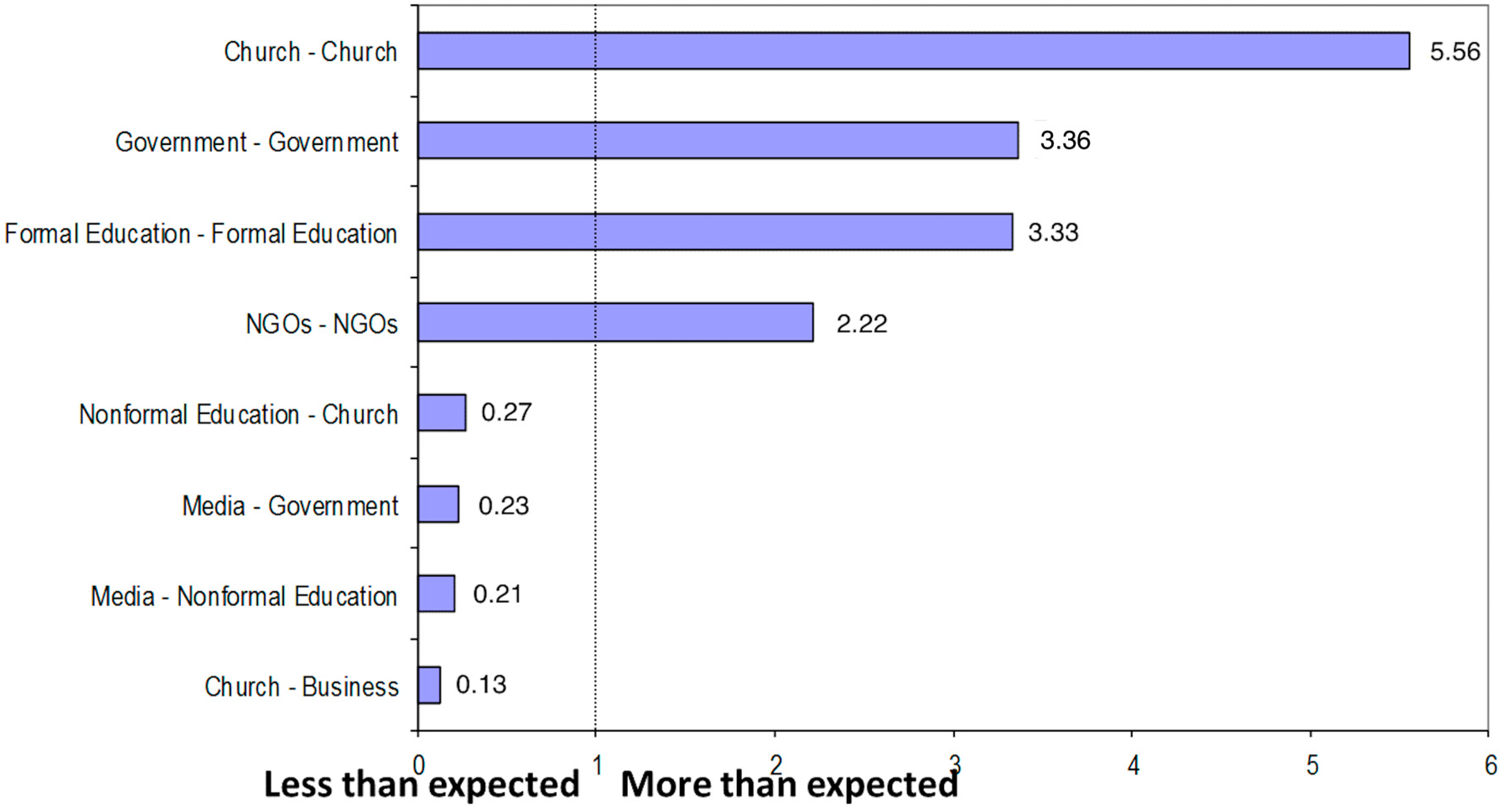
© 2017 by the authors. Licensee MDPI, Basel, Switzerland. This article is an open access article distributed under the terms and conditions of the Creative Commons Attribution (CC BY) license (http://creativecommons.org/licenses/by/4.0/).
Share and Cite
Kolleck, N.; Jörgens, H.; Well, M. Levels of Governance in Policy Innovation Cycles in Community Education: The Cases of Education for Sustainable Development and Climate Change Education. Sustainability 2017, 9, 1966. https://doi.org/10.3390/su9111966
Kolleck N, Jörgens H, Well M. Levels of Governance in Policy Innovation Cycles in Community Education: The Cases of Education for Sustainable Development and Climate Change Education. Sustainability. 2017; 9(11):1966. https://doi.org/10.3390/su9111966
Chicago/Turabian StyleKolleck, Nina, Helge Jörgens, and Mareike Well. 2017. "Levels of Governance in Policy Innovation Cycles in Community Education: The Cases of Education for Sustainable Development and Climate Change Education" Sustainability 9, no. 11: 1966. https://doi.org/10.3390/su9111966
APA StyleKolleck, N., Jörgens, H., & Well, M. (2017). Levels of Governance in Policy Innovation Cycles in Community Education: The Cases of Education for Sustainable Development and Climate Change Education. Sustainability, 9(11), 1966. https://doi.org/10.3390/su9111966




